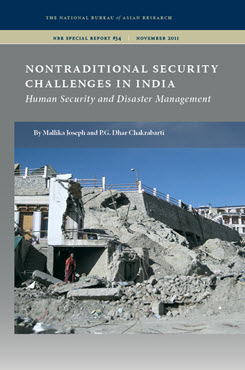Human Security Challenges in India
This essay briefly analyzes the significant human security challenges that India faces today and identifies those that are likely to persist in 2025.
EXECUTIVE SUMMARY
This essay briefly analyzes the significant human security challenges that India faces today and identifies those that are likely to persist in 2025.
MAIN FINDINGS
- While India is home to the world’s richest people, it is also home to the world’s poorest. This huge economic disparity will determine the status of human and national security in India in 2025. Advances in mass communication have contributed to a more integrated, interdependent, and informed polity that is unlikely to continue passively accepting such stark economic disparities.
- Many policies in India continue to be driven by state-centric frameworks. While reforms are under way to make the government more accountable, transparent, and responsive to the needs of the people, the implementation of these reforms is undermined by high levels of corruption, the criminalization of politics, and weak institutions.
- There is a lack of clear understanding about the elements of human insecurity that are manifest in India. When communities in India revolt as a result of their loss of dignity or access to land, the government views this only as a law-and-order problem that requires police action, rather than implementing responses that are as multidimensional as the causes themselves.
- Chronic misgovernance and total administrative apathy for the developmental needs of marginalized communities have resulted in pockets of acute human security deficit. The rise in regional radicalization and the growing influence of left extremism, such as the Naxalite movement, are only symptoms of emerging disaffection with the government.
POLICY IMPLICATIONS
- If India wishes to reap the future benefits of a vibrant economy, it must address the growing economic disparity in its population. The state of human security in India fifteen years from now will largely depend on its ability to close this gap.
- Many of India’s human security concerns continue to be located within its institutions and structures, which are not easily or equally accessible to all its citizens. Unless India is able to develop social and political delivery systems that distribute the benefits of economic growth beyond the privileged few, the country’s potential to be a regional or global power will be limited.


